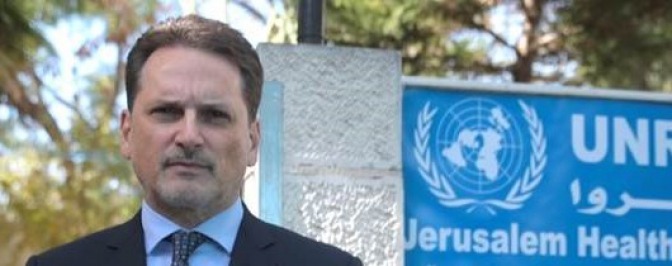Pierre Krähenbühl, Commissioner-General of UNRWA, visited Brussels on Tuesday to thank the EU for its support and inform about upcoming challenges in UNRWA’s operations and finances. Since the US decided in the beginning of the year to cut its aid to UNRWA, the UN agency for support to the Palestinian refugees, the organisation has faced a crisis which threatens its activities in the Middle East. UNRWA provides assistance and protection to some 5.4 million registered Palestine refugees across Jordan, Lebanon, Syria, West Bank, East Jerusalem, and Gaza. Its work depends almost entirely on voluntary contributions.
In January 2018, the US announced that its annual contribution to UNRWA would be $60 million, which represented a reduction in income by $300 million. In August, US announced that it would not fund UNRWA anymore.
“I deeply regret the decision, especially since the US has been a long-standing partner to UNRWA,” Krähenbühl said at a press briefing in Brussels (9 October). “The decision was taken for political reasons and not because of dissatisfaction with UNWRA’s performance”.
Other donors, in particular EU which most recently allocated an additional €50 million for UNRWA in 2018, are concerned about peace in the Middle East and value UNRWA’s stabilizing role in the region. The Trump administration seems mostly caring for its electoral base in the US.
The Israeli government might publicly have supported Trump’s decision but its security and intelligence agencies warned that further deterioration in the economic situation in Gaza, whose population is heavily dependent on UNRWA’s aid, could easily result in a new war. Investments in infrastructure are also needed for electricity supply and waste treatment.
Thanks to new contributions from donors, for example from the four Gulf States which each have pledged $50 million, the shortfall in UNRWA’s budget this year has been reduced to $64 million. Krähenbühl seemed cautiously optimistic that UNRWA could overcome its current financial crisis.
As regards UNRWA’s image as a politically neutral organization, steering its way in a conflict area where Israelis and Palestinians are driven by opposite narratives about the conflict, he might have more reason to worry.
In an open letter in September pleading for contributions to UNRWA he described the cause of the refugee problem as “forced displacement” and argued for continuing extending the refugee status to the descendants of the refugees, many of whom have become citizens in their countries of residence, in particular in Jordan.
Could UNRWA’s fund raising be negatively affected if is perceived as not being neutral in the conflict? UNRWA’s Commissioner-General admitted that it is a difficult task and requires a huge effort since he and his staff are facing the human consequences of war.
“That said, I don’t agree that we are sharing one of the narratives in the conflict,” he underlined. “As a humanitarian organisation, established by UN, we are bound by the principle of neutrality. We are criticising both sides if their actions interfere in our work or breach international law.”
UNRWA is the only UN organisation still caring for a specific refugee community but Krähenbühl rejected allegations that UNRWA has been perpetuating the conflict and blocked integration of the Palestinian refugees. “It is the failure to end conflicts that prolongs refugee situations and denies refugees the choice to define a dignified future of their own.”
He is proud of the pupils studying in UNWRA’s education system, described by the World Bank as a “global public good”. They want to be seen as human beings with a future and not as refugees.
M.Apelblat
The Brussels Time

